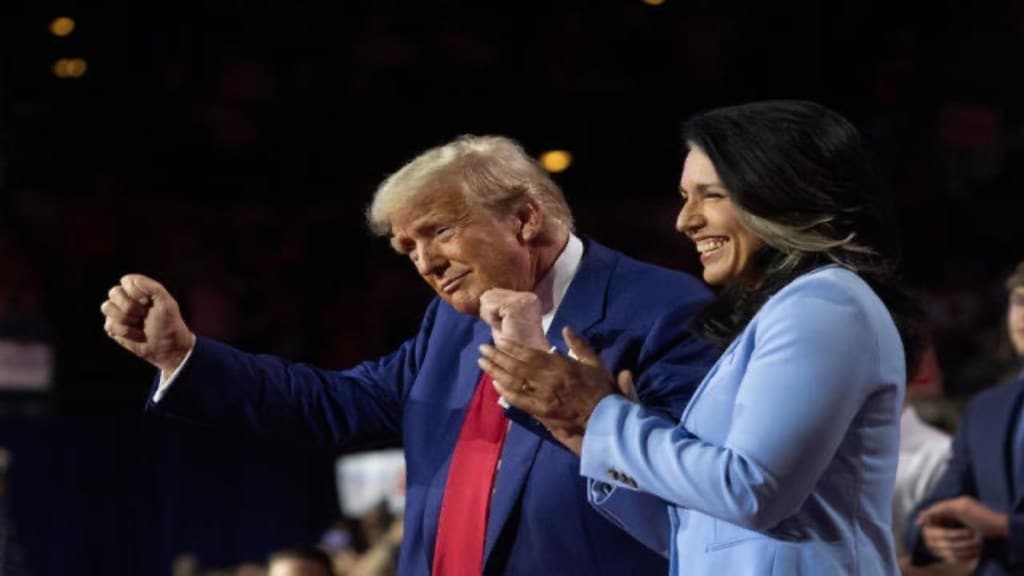Tulsi Gabbard, the former Democratic congresswoman from Hawaii, is making headlines once again, this time with a controversial nomination to serve as the Director of National Intelligence (DNI). Gabbard would oversee the US intelligence community, including the CIA, FBI, and other agencies with a combined budget of $76 billion.
But her rise to this position, after breaking from her own party and aligning herself with former President Donald Trump, has sparked significant debate.
Here is a closer look at who Tulsi Gabbard is:
Tulsi Gabbard, born in American Samoa in 1981, is a former US Army officer and politician. She first gained national attention in 2012 when she became the first Hindu elected to Congress, representing Hawaii’s 2nd district. A rising star in the Democratic Party, Gabbard served four terms in Congress and even became the vice chair of the Democratic National Committee (DNC) in 2013.
Her military background, including her service in the Iraq War and as a field medical unit member in the Hawaii Army National Guard, helped shape her political persona. Gabbard built a reputation as a strong, independent leader, but over time, her stances began to shift, earning her both supporters and critics from across the political spectrum.
From Democrat to MAGA Ally
Her political evolution has been dramatic. In 2019, she made headlines when she voted `present’ on the impeachment of President Donald Trump, defying her party’s majority. She also worked with Republicans on issues like extreme vetting for refugees from Syria and Iraq.
In a surprising turn, Gabbard officially left the Democratic Party in 2021, criticizing it for being `controlled by an elitist cabal of warmongers’ and accusing the party of fostering `anti-white racism.’ Her decision to align with conservative media and formally join the Republican Party in 2022 cemented her status as a major figure in the MAGA (Make America Great Again) movement.
Her relationship with Trump grew closer after she endorsed him during his re-election campaign. She served as a surrogate for the Trump campaign and even joined his transition team following his election loss in 2020.
Despite her shift to the right, Gabbard’s past remains a source of controversy. During her time in Congress, Gabbard made headlines for her stance on Syria. She notably met with Syrian President Bashar al-Assad in 2017, just before Trump’s inauguration, during what she called a `fact-finding mission.’ Her visit to meet with Assad, who has been accused of war crimes, including chemical attacks on civilians, was widely criticized.
Additionally, Gabbard’s defense of former NSA contractor Edward Snowden, who leaked classified information, has raised eyebrows in the national security community. These actions have led many to label her as a `Russian asset’ or sympathizer, although she has strongly denied these accusations.
She also made headlines for her controversial views on the LGBTQ+ community. Early in her political career, she worked for her father’s anti-LGBTQ organization, a position she later renounced, apologizing for her past views.
Role in US Intelligence
Now, Gabbard’s nomination to head the intelligence community has placed her back in the political spotlight. If confirmed, she would lead 18 intelligence agencies, including the CIA, FBI, and NSA, and have control over a massive budget. Her limited experience in the intelligence field, coupled with her past comments, has raised concerns about her ability to manage such a crucial role.
Gabbard’s nomination is further complicated by her close ties to Trump and her past criticism of U.S. intelligence agencies. Trump has often expressed mistrust of these agencies, claiming that `corrupt actors’ have infiltrated the system. His endorsement of Gabbard aligns with his efforts to reshape the US intelligence community to better align with his political goals.
What Gabbard’s nomination means for India
For India, her rise to a powerful position in the US government could hold significant implications. She has long been an advocate for stronger US-India ties. Her Hindu faith and heritage — she is the first practicing Hindu to serve in Congress give her a unique connection to India, and she has been a vocal supporter of India’s interests on the international stage.
During her time in Congress, Gabbard spoke out against Pakistan’s actions in Kashmir and supported India’s stance on terrorism. She has been seen as a supporter of India’s democracy and its position in the region, especially in the face of growing Chinese influence.
With Gabbard at the helm of the intelligence community, there could be a shift in US policy toward a more favorable approach to India. Her past statements suggest she is open to strengthening US-India relations, and her background in military affairs might lead to more robust cooperation in defense and counterterrorism efforts.
The Road Ahead
While Gabbard’s nomination has many supporters within the Republican Party, she faces strong opposition from critics who question her ability to lead the intelligence community effectively. A group of former national security officials has raised concerns about her past actions and her limited experience in intelligence work. As a result, her confirmation is expected to face a difficult road in the Senate.
For India, her rise is a potential opportunity to enhance ties with the US, especially in areas like defense, counterterrorism, and economic collaboration.


